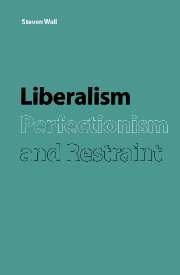Book contents
- Frontmatter
- Contents
- Acknowledgments
- Introduction
- 1 Perfectionism
- Part I The rejection of the bracketing strategy
- 2 The idea of restraint
- 3 Political liberalism and the bracketing strategy
- 4 Toleration, reasonable rejectability and restraint
- 5 Public justification and the transparency argument
- Part II Autonomy and perfectionism
- Bibliography
- Index
5 - Public justification and the transparency argument
Published online by Cambridge University Press: 09 November 2009
- Frontmatter
- Contents
- Acknowledgments
- Introduction
- 1 Perfectionism
- Part I The rejection of the bracketing strategy
- 2 The idea of restraint
- 3 Political liberalism and the bracketing strategy
- 4 Toleration, reasonable rejectability and restraint
- 5 Public justification and the transparency argument
- Part II Autonomy and perfectionism
- Bibliography
- Index
Summary
So far the discussion has shown that the pragmatic argument, the argument from political justification and the argument from democratic toleration all fail to justify the bracketing strategy. For the most part, however, the arguments we have considered have centered on the second principle of restraint, the principle that states that citizens should refrain from acting with the intention to promote through political action controversial ideals and values or comprehensive conceptions of justice. But it is arguable that the third principle of restraint is the one that is really fundamental. The third principle of restraint, to recall, requires citizens to refrain from basing their political arguments on reasons or considerations that are controversial or not publicly accessible.
The reason for believing that the third principle is the more fundamental principle of restraint is that we often do not have access to the intentions of political actors. It is possible, as I have pointed out, for citizens to seek to advance controversial ideals without appealing to those ideals in political argument. In other words, it is possible for citizens to satisfy the third principle of restraint while violating the second. Moreover, citizens often have good strategic reasons for complying with the third principle. Effective political argument aims to persuade, and persuasive arguments often need to start from shared beliefs and values. But if all this is true, why should the proponent of restraint especially care whether or not citizens intend to advance controversial ideals and values? Is it not enough if they show restraint in their public political discussion?
More to the point, if the second principle of restraint were dropped, an interesting consequence would follow for Rawls' argument.
- Type
- Chapter
- Information
- Liberalism, Perfectionism and Restraint , pp. 105 - 124Publisher: Cambridge University PressPrint publication year: 1998



